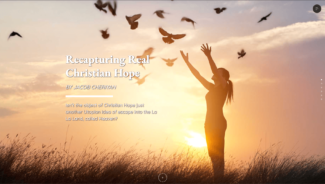

An Antidote to Sad Memories – Christmas

For good reasons many of us have little motivation to be cheerful this year, especially considering how this year has gone by. Looking back at this year our memory of it will most likely be skewed. It’s been marked by loss. People have lost their lives. We’ve lost loved ones. Individuals have lost their livelihoods. Emotionally people have been drained. And in some cases, relationships have been strained.
Studies have shown that when a recent experience has been negative the propensity to feel sad is higher than normal.[1] Our inclination to paint most past memories as bad because of one recent negative experience is not unusual. A study was done comparing the reactions of two groups of people A and B. A viewed a sad video clipping and B a neutral (neither sad or happy) video clipping. Researchers then asked A and B to recount either a happy or sad experience from the past year. A majority from group A chose to remember a sad memory. And when given a chance to choose a second memory some still picked a second negative memory.
COVID-19 is not the only negative experience that has been etched in our memory. Each of us may be able to recount negative memories that have left an undesirable effect on us; a relationship gone bad, an accident, a burglary or even witnessing something terrible. These negative feelings have long term effects and tend to colour many of our past and future experiences. This affects our behaviour, our choices and our fears. And if these memories have an overbearing effect it may even prevent us from operating effectively.
In some cases, depression is often linked with certain patterns of thinking that create an atmosphere that enables depressive feelings to thrive. And to recall positive memories might be thwarted. As a solution Psychologists today suggest that people must attempt to recreate, and interpret vivid positive experiences to counter negative memories.
Where can we draw these positive memories from?
While religion often rightly gets bad press, I’d like to suggest that religious festivals help in creating and interpreting positive memories at regular intervals. Every festive season people get an opportunity to break away from the regular scheme of things and step into another alternate reality. These breaks can perhaps help create vivid positive experiences.[2] Festivals foster an environment for positive memories to flourish. Religion therefore is a great source of helping people in a controlled environment with a controlled group of people to help one another create positive memories.


For Christians, Advent and Christmas are positive reminders that there is hope. While our memories might induce hopelessness, the birth of Christ is meant to induce hope. Tagore once said, “For every child that is born, it brings with it the hope that God is not yet disappointed with man.” The birth of any child signifies new beginnings, new hope, and new opportunities. Christ offers the possibility of renewing this childlikeness in us.
A child induces positive memories of what we were once – full of enthusiasm and dreams to be fulfilled. Some years ago when our son was hardly a year old, a couple of my students were visiting us and one of them picked him up and said, “I wish I hadn’t lost my innocence” – in the presence of a child a memory was induced. In most cases we are no different from my student, we have grown up and we come with a mixed bag of experiences.
However, in the midst of all these experiences, hope can still be infused into us. A child reminds us that perhaps we can do better next time. It rekindles memories of what once was and could be. Renewing in us the opportunity to recreate positive memories.
A child reminds us that perhaps we can do better next time. It rekindles memories of what once was and could be. Renewing in us the opportunity to recreate positive memories.
The birth of the Christ child does exactly that, it renews humanities longing to be recreated; to start afresh. The special difference being that the Christ child makes a world of a difference not only to particular individuals, but to the entire human race. Jesus by virtue of being both God and man now has a cosmic reach with regard to salvation.
The question often arises where did Jesus get his Y chromosome from? One answer is provided in the conversation that Mary has with Gabriel, implying that the Holy Spirit provides it. Few theologians today question the texts of Matthew and Luke that relate to the virgin birth citing that they were added later. While denying virginal conception, philosophically and theologically does not affect the incarnation, not all scholars are in agreement with that position.[3]
For instance, Karl Barth clarifies that the birth of Jesus is not a marriage between God and Mary, rather it is a special creative act of God through which Jesus is specially formed in the womb of Mary. This view is in accordance with both the Bible and tradition. Karl Barth affirms the Christian creed, “Jesus is begotten not made.” All of this points to the divinity of Jesus and its implications for all humanity. This unique combination has the power to bring hope to all men. And it is for this reason Christmas is worth the celebration.
Advent and Christmas are positive reminders that there is hope. While our memories might induce hopelessness, the birth of Christ is meant to induce hope.


In Netflix’s recent Christmas musical, Jingle Jangle, Jeronicus Jangle an inventor, is on the threshold of success, when he is cheated by his apprentice and loses everything that he had worked hard for. Along with losing his book of inventions, he loses hope; this is compounded with the death of his wife and in an estranged relationship with his daughter. Everything appears to have fallen apart.
With the loss of hope he begins to live a substandard life. A life that isn’t fulfilling its ultimate purpose. Seeing his lack of interest, a friend tries to rekindle hope,
Just because you fell down
Don’t believe you can’t pick yourself up again
Just because it looks broke
Don’t believe it won’t turn around and mend again
Just because it’s lost
Even if it’s your fault, you can find its way home again
You gotta stay open, keep hopin’
‘Cause I know
The tautology – without hope it’s quite hopeless – has some truth to it. Hope is a crucial ingredient for us to keep going. Without hope life becomes a series of meaningless activities. Our memory of the ideal self becomes a lost and distant dream; perhaps a burden. And as a result, some of us settle for something lesser.
Eventually for Jeronicus Jangle the arrival of his grandchild helps him see the world in new light. Every Christmas this memory is brought closer reminding humanity that there is hope and it can be renewed even when our circumstances seem skewed.

The circumstances surrounding the birth of Jesus was also skewed; there was a lot of bloodshed. Through it all the Christ child reminds us, both then and now, of the potential that lay latent in humanity and in each one of us waiting to be activated. Faith is precisely to be open to this renewal.
“You can pick yourself up again. You can turn around and mend again. Even if it’s your fault, you can find your way back home.” The mistakes that we have made is not the end of your journey. Dukkha doesn’t have to be your default position. Because Christ represents new life, forgiveness and hope – and so we sing,
O come, Thou Day-Spring, come and cheer
Our spirits by Thine advent here
Disperse the gloomy clouds of night
And death’s dark shadows put to flight
Rejoice! Rejoice!
Emmanuel shall come to thee…
The birth of the Christ child does exactly that, it renews humanities longing to be recreated; to start afresh. The special difference being that the Christ child makes a world of a difference not only to particular individuals, but to the entire human race.
[1]Braden R. Josephson, “Mood Regulation and Memory: Repairing Sad Moods with Happy Memories,” Cognition & Emotion 10, no. 4 (1996): 437-444, DOI: 10.1080/026999396380222.
[2]Even if a certain festival induces negative feelings, we are given the opportunity with every new festival to create new positive memories.
[3]Oliver D. Crisp, God Incarnate: Explorations in Christology (New York: T&T Clark International, 2009), pp. 77-102.


